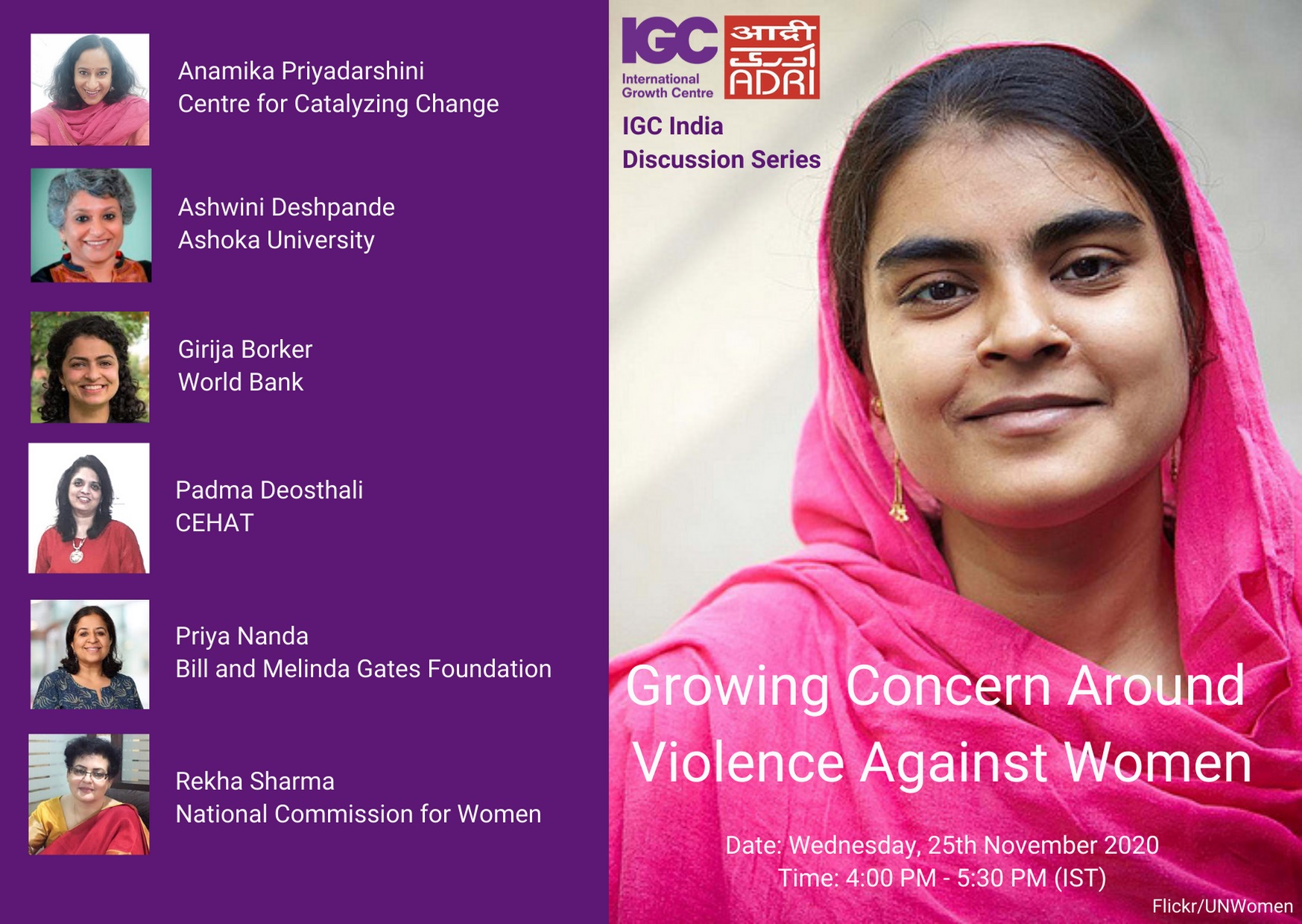Events of IGC

Title: The Growing Concern Around Violence Against Women and Girls
Panellists: Anamika Priyadarshini (Centre for Catalyzing Change), Ashwini Deshpande (Ashoka University), Girija Borker (World Bank), Padma Deosthali (CEHAT), Priya Nanda (Bill and Melinda Gates Foundation) and Senior Bureaucrat (Government of India – TBC)
Date and Time: 25th November 2020, 16.00 - 17.30 (IST)
Zoom Link for Registration: Registration Link
Brief: Violence against women and girls (VAWG) is a human rights violation with great impact on victims, their families, and communities and is a growing concern both for India and the World. The global estimation states that 18% of women and girls aged 15 to 49 years have experienced physical or sexual violence by an intimate partner in the previous 12 months (UN Women 2020), while in India this number increases to 24% (NFHS-4). With COVID-19, an increased reporting of domestic violence exposes the fault lines of gender equality which needs urgent attention. It becomes all the more important to create a space for having the necessary dialogues around the issue in India. To walk the talk on this issue, International Growth Centre (IGC) of London School of Economics (LSE) and Asian Development Research Institute (ADRI) is organising a webinar on the growing concern around Violence Against Women and Girls on 25th November 2020 at 4:00 PM (IST)
Patna, November 25. International Growth Centre (IGC) and Asian Development Research Institute (ADRI) organised a webinar titled, ‘The growing concern around violence against women and girls’ on 25th Novemeber 2020. The panel was moderated by Priya Nanda (Senior Program Officer, Bill and Melinda Gates Foundation). The event panellists were Anamika Priyadarshini (Research Lead, Centre for Catalyzing Change), Girija Borker (Economist, World Bank), Padma Deosthali (Senior Advisor, CEHAT).
Violence against women and girls (VAWG) is a human rights violation with great impact on victims, their families, and communities and is a growing concern both for India and the World. The global estimation states that 18% of women and girls aged 15 to 49 years have experienced physical or sexual violence by an intimate partner in the previous 12 months (UN Women 2020), while in India this number increases to 24% (NFHS-4). Furthermore, 31.1% ever-married women in India have ever experienced spousal violence, 43.2% ever-married women in Bihar who have ever experienced spousal violence (NFHS-4).
Priya Nanda - The cost of violence against women (public, private and social) has been estimated to impact the growth of the economy. We need to realise that Women’s work and their participation in the labour force is necessary for the growth of the economy. Hence understanding the parallels which stop or hinder the participation of women’s labour force participation and then working towards a collaborative effort to strengthen the policies and implementation. Data from the National Commission of Women (NCW) shows that in India, women filed more domestic violence complaints during the lockdown than recorded in a similar period in the last 10 years. Between March 25 and May 31, 1,477 complaints of domestic violence have been registered. This 68-day period recorded more complaints than those received between March and May in the previous 10 years
Anamika Priyadarshini - Women feel that the violence they have experienced is their fault. Yes there is progressive system but at the same time it's in a cultural context which means in theory we have progressive system but not necessarily in our attitudes. Norms are pervasive.
Sensitization programs in school for adolescents are needed and electoral representatives can take initiative to facilitate such programs. Also, shelter homes can be revived & engage in income generation activity & create a space where women feel safe. In Bihar, community level collectives have been successful in curbing VAW.
Girija Borker - In terms of Female Labour Force Participation, there is a huge mismatch in the sector; especially the sectors women want to work in do not have enough jobs whereas the sectors which are wanting more women there is a lack.
Due to fear of street harassment and barriers in travel safety it is observed that college going women in Delhi are ready to shift their option from top 20% college to bottom 50% college and pay twice more as annual tuition. Design of public transportation has to be focused in a gender sensitive way.
Padma Deosthali -Health systems have a legal and quality mandate now; in 2017 the health policy in India now has gender violence as a public health issue. Ministry of Health has issued medical care guidelines for survivors of rape; yet there is no guidelines for Domestic Violence. The current concern with the public health sector is how to respond to domestic violence cases and how survivors should be treated in such a case especially psychologically. Govt dept. are now integrated with hospital staff which helps in institutionalizing response to violence & partnerships of govt. with NGOs, health researchers or women groups who have been running these interventions have helped over the last 20yrs. Women, particularly from lower socio-economic backgrounds, visit public health hospitals more often; and hence expectation setting around quality care from the health officials/providers should be focused.
Closing remarks were given by Dr. Prabhat P Ghosh - Director ADRI. He emphasized the need to have access to more data around this issue and the various dimensions that impact violence against women and hence it becomes all the more important to create a research space for around the issue. Violence against women hinders educational attainment and earnings potential and has significant economic and social costs. COVID-19 has exposed the fault lines of gender equality, with increases in the incidence of domestic violence during lockdown.
Concept Note